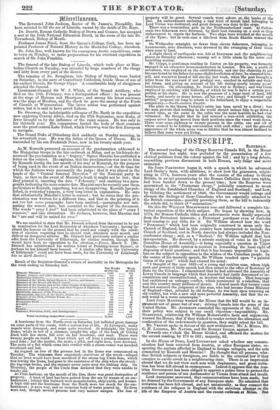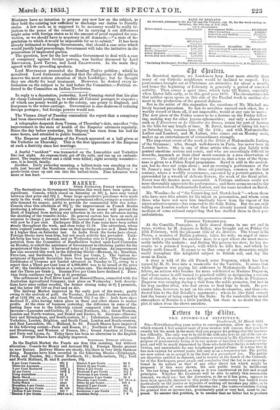POSTSCRIPT.
SATURDAY.
The second reading of the Clergy Reserves Canada Bill, in the House of Commons last night, was preluded by the presentation of a few clerical petitions from the colony against the bill; and by a long debate, resembling previous discussions in both Houses, only fullgr and more animated.
Sir joim PAKINOTON began it, with a speech in which he advanced
Lord Derby's facts, with additions, to show how the guarantee, origin- ating in 1774, fourteen years after the cession of the colony to Great Britain, in an act guaranteeing to the Roman Catholics their own rights, had been handed down to the present time • how the Reserves were guaranteed to the "Protestant clergy," judicially construed to mean clergy of the Established Churches of England and Scotland ; and how, by violating the settlement of 1840, the Government would outrage and alienate the feelings of those Canadians who are especially attached to the British connexion—possibly provoking them, as the bill to indemnify the rebels did, to think of" annexation."
On this Sir WJT.T,T A 1K MoLusworrra rose and delivered a complete his-
torical exposition of the whole subject. He began by showing how, in 1774, the Roman Catholic tithes and endowments were finally separated from the Protestant interests ; a Protestant purchaser even of Catholic land ceasing to pay tithe for it. Sir William showed how the word "Protestant," which had been originally construed to mean only the Church of England, had in this country been interpreted to include the Church of Scotland, and in North America had always included the Non- conformist clergy ; and, as a "Radical," Sir William upheld that last interpretation. He showed, by a minute analysis of votes in the Upper Canadian House of Assembly,—it being especially a question in Upper Canada,—that public opinion is resolute in demanding the local right of disposing of local questions ; and that it has become impossible to legis- late on the subject in opposition to the wishes of the Canadian people. In the course of his masterly speech, Sir William touched upon a painful vision of the past" which had crossed his mind : "I thought of the year 1833—of a young and reckless man, whom high
rank and powers of facile speech had then raised to the office of Secretary of State for the Colonies : I remembered that he had addressed the Assembly of Lower Canada in language which that Assembly had justly denounced as in- considerate and unconstitutional, as insolent and insulting. That language had embittered an unhappy.conflict, which terminated in a rebellion, that cost this country many millions of money. I feared much that twenty years had not matured the judgment of this man, who had become Prime Minister of England—that, actuated by old feelings, he was bent upon renewing an old conflict, but with a new and more powerful Assembly, and that the re- sult would be a worse catastrophe." Lord Jowar MANNERS warned the House that the bill would be an in- strument not of peace but of war ; driving Canada into the arms of the United States. Mr. ADDERLEY reminded the opponents of the bill, that their policy was subject to one small objection—impossibility. Mr. GLADSTONE, reinforcing Sir William Molesworth's facts and arguments, warned the House, that if they wished to render certain the alienation and confiscation of the endowments in question, they might reject the bill. Mr. VERNON spoke in favour of the new settlement; Mr. A. Muse, Mr. G. H. Lumina, Mr. Nests; and Sir ROBERT INums against it.
Towards one o'clock the House divided, and affirmed the motion for the second reading, by 275 to 192; majority, 83.
In the House of Peers, Lord LYNDHURST asked whether any commu- nication had been received from Austria, or other European states, re- specting the asylum afforded in England to foreign refugees, and the acts committed by Kossuth and Mazzini ? He thought that all persons, whe- ther British subjects or foreigners, are liable to the criminal law if they conspire to excite revolt in a neighbouring state. There is an impression abroad that we do not view such acts with displeasure, and great irrita- tion has been felt abroad in consequence. Indeed it appears that the Aus- trian Government has been obliged to appoint a police force to protect the residence and person of our Ambassador at Vienna from attack and insult.
Lord ABERDEEN answered, that communications have been made, but no demand by the Government of any European state. He admitted that irritation has been felt abroad, and not unnaturally, as they connect the residence of the refugees in England with the atrocious attempt on the life of the Emperor of Austria and the recent outbreak at Milan. But Ministers have no intention to propose any new law on the subject, as they hold the existing law suffici.ent to discharge our duties to friendly states. A law such as is supposed to be necessary would be really in- jurious to the peace of the country ; for in carrying it out differences might arise with foreign states as to the amount of proof required for con- viction, or we should have to acquiesce in all demands,—" a state of de- gradation to which it would be impossible for us to submit." It has been already intimated to foreign Governments, that should a case arise which would justify legal proceedings, Government will take the initiative in the prosecution of implicated parties. The question, how far the law enables Government to deal with a case of conspiracy against foreign powers, was further discussed by Lord BROUGHAM, Lord Talmo, and Lord Casisvioara. In the main they agreed with the preceding speakers. Lord MONTEAGLE presented the Bombay Native petition ; which: he moralized. Lord ABRODMIN admitted that the allegations of the petition deserve the most serious attention of their Lordships ; but he thought they are chiefly for local treatment. However, he desired every in- formation on the subject to be laid before the Committee.—Petition re- ferred to the Committee on Indian Territories.

























 Previous page
Previous page